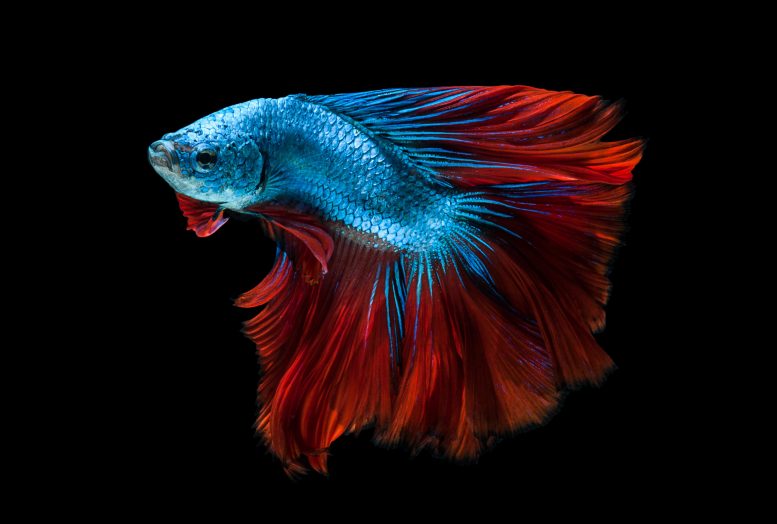
Betta fish opponents undergo similar brain changes that become more synchronized after longer fights.
When two betta fish are fighting for dominance, not only do their attacks mirror each other, but the gene expression in their brain cells also starts to align. The new findings, published June 17th in PLOS Genetics by Norihiro Okada of Kitasato University, Japan, may explain how the fish synchronize their fighting behavior.
The fighting fish Betta splendens is famous for its aggression, but opponents typically stop fighting after assessing the other’s abilities to avoid any serious injuries. The small freshwater fish is commonly used to study aggression in the lab, and it employs a handful of standard tactics like mouth-locking, bites, strikes, and swimming to the surface to gulp air. In the new study, researchers observed that during a fight, two male opponents modify their actions to match the aggressive behavior of the other, leading to tightly synchronized battles.
Furthermore, when the researchers analyzed the brains of both opponents, they observed that the fish also synchronized which genes were turned on or off in brain cells. The fighting pair had similar changes in gene activity related to learning, memory, synapse function, and ion transport across cell membranes. The synchronization was specific to a fighting pair and became stronger after fighting for an hour compared to a 20-minute fight, suggesting that the degree of synchronization was driven by fighting interactions.
The new study takes a neurogenomic approach to the old question of how animals synchronize their behavior. Similar mirrored behaviors also occur during mating, foraging, and cooperative hunting, and these behaviors may also trigger synchronized brain changes in the pairs of animals. “One of my future plans is to elucidate what happens in the male-female interaction of fish on the molecular level,” said author Norihiro Okada.
The findings suggest that even though the betta fish are fighting each other, sometimes to the death, their brains may be cooperating at the molecular level.
Reference: “Behavioral and brain- transcriptomic synchronization between the two opponents of a fighting pair of the fish Betta splendens” by Trieu-Duc Vu, Yuki Iwasaki, Shuji Shigenobu, Akiko Maruko, Kenshiro Oshima, Erica Iioka, Chao-Li Huang, Takashi Abe, Satoshi Tamaki, Yi-Wen Lin, Chih-Kuan Chen, Mei-Yeh Lu, Masaru Hojo, Hao-Ven Wang, Shun-Fen Tzeng, Hao-Jen Huang, Akio Kanai, Takashi Gojobori, Tzen-Yuh Chiang, H. Sunny Sun, Wen-Hsiung Li and Norihiro Okada, 17 June 2020, PLOS Genetics.
DOI: 10.1371/journal.pgen.1008831
Never miss a breakthrough: Join the SciTechDaily newsletter.

1 Comment
Betta fish are truly mesmerizing with their vivid colors and flowing fins, captivating fish enthusiasts everywhere. Known for their strong personalities, these fish thrive in well-maintained aquariums.